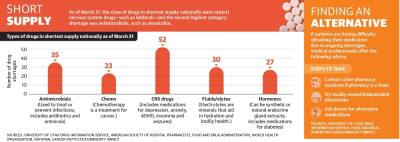At the end of the first quarter of 2023, there were 301 drug shortages nationwide, according to a report from the University of Utah Drug Information Service for the American Society of Hospital Pharmacists, a 23% increase from a year ago.
The U.S. Food and Drug Administration added Adderall to its list of medication shortages in the fall. Dr. Joshua Wollen, a clinical assistant professor at the University of Houston’s pharmacy practice and translation research department, said the three most prominent medication shortages are Adderall, Albuterol and Ozempic, which are typically prescribed to treat attention deficit hyperactivity disorder, asthma and diabetes, respectively.
“The FDA lists about 150 or so drugs currently that are on shortage,” Wollen said. “The majority of them are inpatient and are not used as widely as these three groups.”
Wollen said the reasons for the shortages—including increases in demand and manufacturing problems—depend on the medication.
Taylor Mealey, a Conroe resident and local pharmacist, said the shortages have worsened at her Conroe pharmacy since August.
“My current manager has been in pharmacy for almost 30 years, and she’s said multiple times before that she’s never seen anything like this,” Mealey said.
Medications affected
Van Tran, the pharmacist in charge at Roberds Pharmacy in Conroe, said the medication shortages began around the spike of the COVID-19 pandemic and have continued since. She said the pharmacy’s staff have noticed shortages in everything from blood pressure medication to more rare medications, including a major shortage of Adderall.
The FDA added the medication to its shortage list Oct. 10, with multiple pharmaceutical manufacturers citing “demand increase” or “shortage of active ingredient” as the causes, according to the FDA’s website.
Ursula Tachie-Menson, director of pharmacy services at Memorial Hermann The Woodlands Medical Center, is in charge of the medication distribution for the hospital. Tachie-Menson said the hospital has struggled with medication shortages the last two years, noting shortages in Lidocaine, used for anesthetics, and even Tylenol.
She said, despite these shortages, the hospital has never been unable to give a life-saving drug to a patient.
“All we care about is our patients and making sure that we can give them what they need,” Tachie-Menson said. “From the littlest patients to the oldest patients, ... it’s often heartbreaking to see that we have things that they should be able to get easily is just a struggle to get.”
Origin of shortages
For 2022, 19% of drug manufacturers blamed supply and demand for U.S. medication shortages, and 18% cited manufacturing issues, according to the University of Utah Drug Information Service. Meanwhile, 56% of manufacturers did not know the cause or would not provide a cause.
Wollen said reasons for the shortages vary from demand outweighing supply to manufacturing shortages. For Ozempic, he cited more individuals seeking the medication for its weight loss side effects. He attributed Adderall shortages to rising mental health care access.
“People are able to get seen and get treated for mental health issues much more readily, and so that has caused the increase in demand that the supply chain didn’t have enough to keep up with,” Wollen said.
Albuterol shortages are due to a manufacturing shortage, Wollen said, as some generic manufacturers no longer produce the drug or are changing the way they manufacture it.
Tran also cited manufacturing issues with the medication challenges facing pharmacies.
Pharmacies get their drugs from a wholesaler who receives its product from a manufacturer, she said. Manufacturers, who could be located in the U.S. or overseas, will run into shutdowns for recalls or they may be short-staffed.
“Manufacturer [sells] to wholesalers, wholesalers sell to [pharmacists], and if a wholesaler cannot get the medication from any manufacturer, then we will be on backorder, and the patient won’t get [it],” Tran said.
Tran said those experiencing delays can reach out to compounding pharmacies, such as Roberds Pharmacy, that can source powders and make the medication while the prescription is on backorder. Anything commercially available cannot be compounded.
Mealey recommended those who need refills in their medication to refill their prescriptions a week before they would run out.
“The best practice is really just to call around and see who has [the medication] and who doesn’t,” Mealey said.
Additional reporting by Lizzy Spangler








